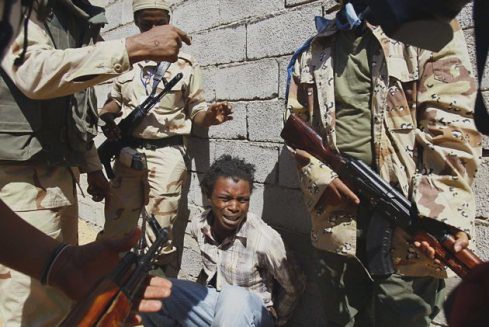
Africans being tortured by the CIA-trained rebels now roaming the North African state of Libya. The rebels were suppoted and installed by the imperialist states., a photo by Pan-African News Wire File Photos on Flickr.
Libya’s future will be determined by more than elections
By Anne Applebaum
Posted Tuesday, May 22, 2012, at 3:16 PM ET ET Slate.com
Libya’s Invisible Forces
The country’s transition from Qaddafi’s nightmare (the real nightmare is the ongoing US-NATO occupation through the NTC rebels if you carefully read this report, editor's remark) to something better will take more than elections.
TRIPOLI—If you didn't know what lay behind the gates of the vast structure in Janzour, just outside the Libyan capital, you'd probably assume it was the Libyan Naval Academy.
That, after all, is what it used to be. But drive past the empty main building and into the former living quarters, and you won't see any sailors. Laundry hangs from the balconies. Children play in the dust below. Women in black abayas walk up and down the concrete plazas, while elderly men in long white gowns smoke cigarettes and stare at the sea.
Instead of junior officers, the naval academy now houses more than 2,000 refugees, a fraction of the 70,000 people displaced by the Libyan revolution and scattered across the country. Most of this camp's residents come from Tawergha, a town whose inhabitants had the misfortune to be caught between soldiers loyal to Muammar Qaddafi and the anti- Qaddafi militia forces in the nearby city of Misrata last summer. A few residents—no one agrees how many—joined the regime's soldiers, and now the Misrata militia doesn't want any of them back. To be precise, the militia has threatened to murder anyone who returns and has bombarded some of their homes for good measure.
You won't learn much about Janzour from the Libyan media. Although Libyan journalists have filmed interviews at the camp, their reporting has yet to be broadcast, and no one is quite sure why. The journalists speak of different priorities—the country is preparing for elections—but those in the camp blame pressure from the Misrata militia or racism: Most of the refugees are black. Lack of coverage means lack of interest. Nobody in power feels any urgency to help them.
And thus the Tawerghans remain, semi-invisible, in limbo, like so many other things in Libya, where power is still held by a Transitional National Council and a provisional government; where elections are scheduled for June; where decisions are suspended "until we have a government" and would-be investors hang around the lobby of the Radisson, drinking mint tea and waiting to see what will happen next.
This might be a good thing: In a society where everything has been controlled for more than four decades, a vacuum can be creative. Civil society, unknown in Libya until the revolution last year, has begun to reformulate, and civic groups have emerged to help care for refugees and to lobby on their behalf. The brand-new Libyan Housing Authority, a charity, helped arrange for journalists to go to Janzour. The camp itself has elected a spokesman, and tribal leaders are negotiating with the Misratans about a possible return.
But just as a vacuum can produce constructive forces, it can produce destructive ones, too. Janzour has been attacked more than once by armed militia members from Misrata. In a recent raid, five people were killed.
What is true of Janzour is true of everything else: The Libyan media hangs in a legal and institutional vacuum. While in Tripoli this week—I was visiting on behalf of the Legatum Institute—I went to at least three institutions that thought they were responsible for state-owned media, and I spoke with one state television boss who felt beholden to none of them. Dozens of newspapers and radio and television stations have emerged, as has a new breed of citizen journalist: popular talk-show hosts who have never spoken on the radio before, writers whose work previously appeared in anonymous blogs.
Would-be regulators are proliferating almost as quickly. Wanting fair elections, the transitional authorities passed a law mandating equal coverage to all 2,000 parliamentary candidates. Some think this means that anyone who airs an interview with one candidate is legally obligated to cover the other 1,999. Hoping to prevent regime loyalists from returning to public life, the transitional authorities have also banned any criticism of the revolution. But the law they have written is so vague it could imply imprisonment for anyone critical of the current government, or perhaps anyone who discusses revolutionary excesses in places such as Misrata. In that climate, it's easy to see why Libyan reporters might not want to write about the refugees in Janzour.
Describe this situation to anyone here and most will shrug: "It will change after the elections, Inshallah, when this 'transitional period' ends."
But while the election will give Libya its first legitimate government in generations, ( legitimate for who, imperialism?, editor's remark) it won't decide everything. The real contest isn't between the 2,000 candidates or the dozen-odd parties, after all, but the constructive and destructive forces within Libyan society. After the voting ends, watch what happens to the talk-show hosts, the refugee advocates and the environmental activists on the one hand, and the militias and the regulators on the other—and you'll have a good idea which way Libya is heading.
No comments:
Post a Comment